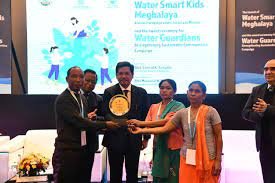Meghalaya Launches “Water Smart Kid Campaign” for Youth Water Conservation Awareness
The picturesque state of Meghalaya, known for its lush greenery and pristine landscapes, has taken a significant stride in fostering environmental consciousness among its younger population. Recently, the state administration unveiled the “Water Smart Kid Campaign,” an innovative initiative aimed at promoting water conservation awareness among the youth. The campaign’s primary objective is to educate and engage school children in understanding the crucial importance of preserving water resources for sustainable development.
The initiative, launched under the guidance of the Meghalaya government, seeks to instill responsible water usage habits among the young minds of the state. With an emphasis on interactive sessions, workshops, and educational activities, the campaign intends to empower children as ambassadors of change in their communities.

Why this News is Important:
Empowering Future Stewards of Water Conservation
The launch of the “Water Smart Kid Campaign” holds immense importance due to its targeted focus on engaging the youth in understanding and championing water conservation. By involving children in such initiatives, the campaign not only educates but also empowers them as proactive contributors to environmental sustainability.
Addressing Growing Environmental Concerns
With global concerns about depleting water resources and escalating environmental issues, the emphasis on water conservation through this campaign becomes crucial. Meghalaya’s proactive approach sets an exemplary model for other regions, highlighting the significance of grassroots-level initiatives in combating environmental challenges.
Historical Context
Environmental Significance in Meghalaya’s History
Meghalaya, known for its abundant natural beauty and rich biodiversity, has a history deeply rooted in its reverence for nature. The state’s traditional societies have historically maintained a harmonious relationship with their natural surroundings, valuing resources like water as sacred and essential for sustenance.
Indigenous Practices and Water Conservation Traditions
Meghalaya’s indigenous communities have long practiced sustainable methods for water preservation. Techniques like traditional water harvesting, use of natural springs, and community-driven conservation efforts have been integral parts of the local culture, ensuring water availability for generations.
Key Takeaways from “Water Smart Kid Campaign”
| Serial Number | Key Takeaway |
|---|---|
| 1. | “Water Smart Kid Campaign” educates youth on water conservation. |
| 2. | Utilizes innovative mediums like art and storytelling for engagement. |
| 3. | Emphasizes community involvement for holistic impact. |
| 4. | Aims to foster a generation conscious of environmental responsibility. |
| 5. | Sets an example for proactive initiatives in tackling water scarcity issues. |
Important FAQs for Students from this News
What is the objective of Meghalaya’s “Water Smart Kid Campaign”?
The campaign aims to promote water conservation awareness among the youth and engage them in responsible water usage practices.
How does the campaign engage children in understanding water conservation?
The campaign employs interactive sessions, workshops, and creative activities like art competitions and storytelling to educate children about water conservation.
Who is involved in the “Water Smart Kid Campaign”?
The campaign involves the Meghalaya government, schools, parents, teachers, and community leaders to create a holistic impact and emphasize collective responsibility towards water conservation.
What is the historical context behind water conservation in Meghalaya?
Meghalaya has a history of valuing water as a sacred resource, with indigenous communities practicing sustainable water preservation methods. Modern challenges have intensified the need for organized conservation efforts.
Why is the “Water Smart Kid Campaign” significant in today’s context?
It empowers children as future stewards of water conservation, addresses growing environmental concerns, and continues Meghalaya’s legacy of valuing and preserving water resources.
Some Important Current Affairs Links

















